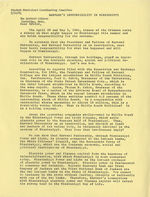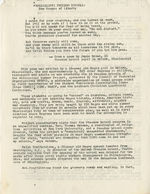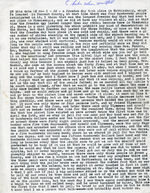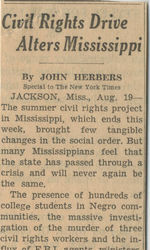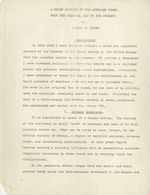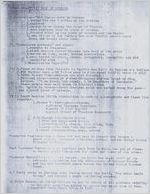Carver, George Washington, 1864?-1943
- Authoritative Name:
- Carver, George Washington, 1864?-1943
- Biography:
- Contemporary Black Biography, Volume 4. Gale Research, 1993. "George Washington Carver devoted his life to research projects connected primarily with Southern agriculture. The products he derived from the peanut and the soybean revolutionized the economy of the South by liberating it from an excessive dependence on cotton. Born a slave in the spring of 1864 in Diamond Grove, Missouri, Carver was only an infant when he and his mother were abducted from his owner's plantation by a band of slave raiders. His mother was sold and shipped away, but Carver was ransomed by his master in exchange for a race horse. While working as a farm hand, Carver managed to obtain a high school education. He was admitted as the first black student of Simpson College, Indianola, Iowa. He then attended Iowa Agricultural College (now Iowa State University) where, while working as the school janitor, he received a degree in agricultural science in 1894. Two years later he received a master's degree from the same school and became the first African-American to serve on its faculty. Within a short time his fame spread, and Booker T. Washington offered him a post at Tuskegee. Carver revolutionized the southern agricultural economy by showing that 300 products could be derived from the peanut. By 1938, peanuts had become a $200 million industry and a chief product of Alabama. Carver also demonstrated that 100 different products could be derived from the sweet potato. Although he did hold three patents, Carver never patented most of the many discoveries he made while at Tuskegee, saying "God gave them to me, how can I sell them to someone else?" In 1938 he donated over $30,000 of his life's savings to the George Washington Carver Foundation and willed the rest of his estate to the organization so his work might be carried on after his death. He died on January 5, 1943."
- Associated Subjects:
- Carver, George Washington, 1864?-1943
- Archival Collections And Reference Resources:
-
8 items in 4 collections (expand all)
CORE Southern Regional Office--Student Nonviolent Coordinating Committee, May 1964-August 1965 (Congress of Racial Equality. Southern Regional Office records, 1954-1966; Archives Main Stacks, Mss 85, Box 16, Folder 11)
- Creator:
- Congress of Racial Equality. Southern Regional Office
- Date of Original:
- 1964/1965
- Collection:
- Freedom Summer Digital Collection
- Contributing Institution:
- Wisconsin Historical Society
Kaplow--Friends of SNCC - General, 1964-1967, undated (Alicia Kaplow papers, 1964-1968; Archives Main Stacks, Mss 507, Box 1, Folder 5)
- Creator:
- Kaplow, Alicia, 1945-
- Date of Original:
- 1964
- Collection:
- Freedom Summer Digital Collection
- Contributing Institution:
- Wisconsin Historical Society
Kaplow--Friends of SNCC - correspondence, 1964-1967, undated (Alicia Kaplow papers, 1964-1968; Archives Main Stacks, Mss 507, Box 1, Folder 3)
- Creator:
- Kaplow, Alicia, 1945-
- Date of Original:
- 1964/1966
- Collection:
- Freedom Summer Digital Collection
- Contributing Institution:
- Wisconsin Historical Society
Lynd--Missississippi Freedom Schools, 1964 -1965 (Staughton and Alice Lynd papers 1938-2008; Archives Main Stacks, Mss 395, Box 4, Folder 13)
- Creator:
- Lynd, Staughton
- Date of Original:
- 1964
1965 - Collection:
- Freedom Summer Digital Collection
- Contributing Institution:
- Wisconsin Historical Society
Robinson--Freedom School materials (Jo Ann Ooiman Robinson papers, 1960-1966; Archives Main Stacks, Mss 191, Box 1, Folder 6)
- Creator:
- Robinson, Jo Ann, 1942-
- Date of Original:
- 1960/1966
- Collection:
- Freedom Summer Digital Collection
- Contributing Institution:
- Wisconsin Historical Society
Enumeration of reasons for supporting Rural Regional Coordination Demonstration Program
- Creator:
- Newman, I. DeQuincey (Isaiah DeQuincey), 1911-1985
- Date of Original:
- 1929/2003
- Collection:
- Isaiah DeQuincey Newman, (1911-1985), Papers, 1929-2003
- Contributing Institution:
- University of South Carolina. South Carolina Political Collections
Oral History Interview with Cecil Brown Jr. and Loretta, August 9, 1995, part III
- Creator:
- Brown, Loretta
- Date of Original:
- 1995-08-09
- Collection:
- March on Milwaukee: Civil Rights History Project
- Contributing Institution:
- Golda Meir Library. Special Collections
Billie Gaines interview
- Creator:
- Gaines, Billie Davis, 1937-
Merritt, Carole - Date of Original:
- 2006-02-16
- Collection:
- Voices Across The Color Line Oral History Collection, 2005-2006
- Contributing Institution:
- Atlanta History Center
- Educator Resources:
-
1 items in 1 collections (expand all)
17-1 Lesson taken from the First Book of Negroes, page 1
- Creator:
- Milwaukee United School Integration Committee
- Date of Original:
- 1964/1966
- Collection:
- March on Milwaukee: Civil Rights History Project
- Contributing Institution:
- Wisconsin Historical Society
